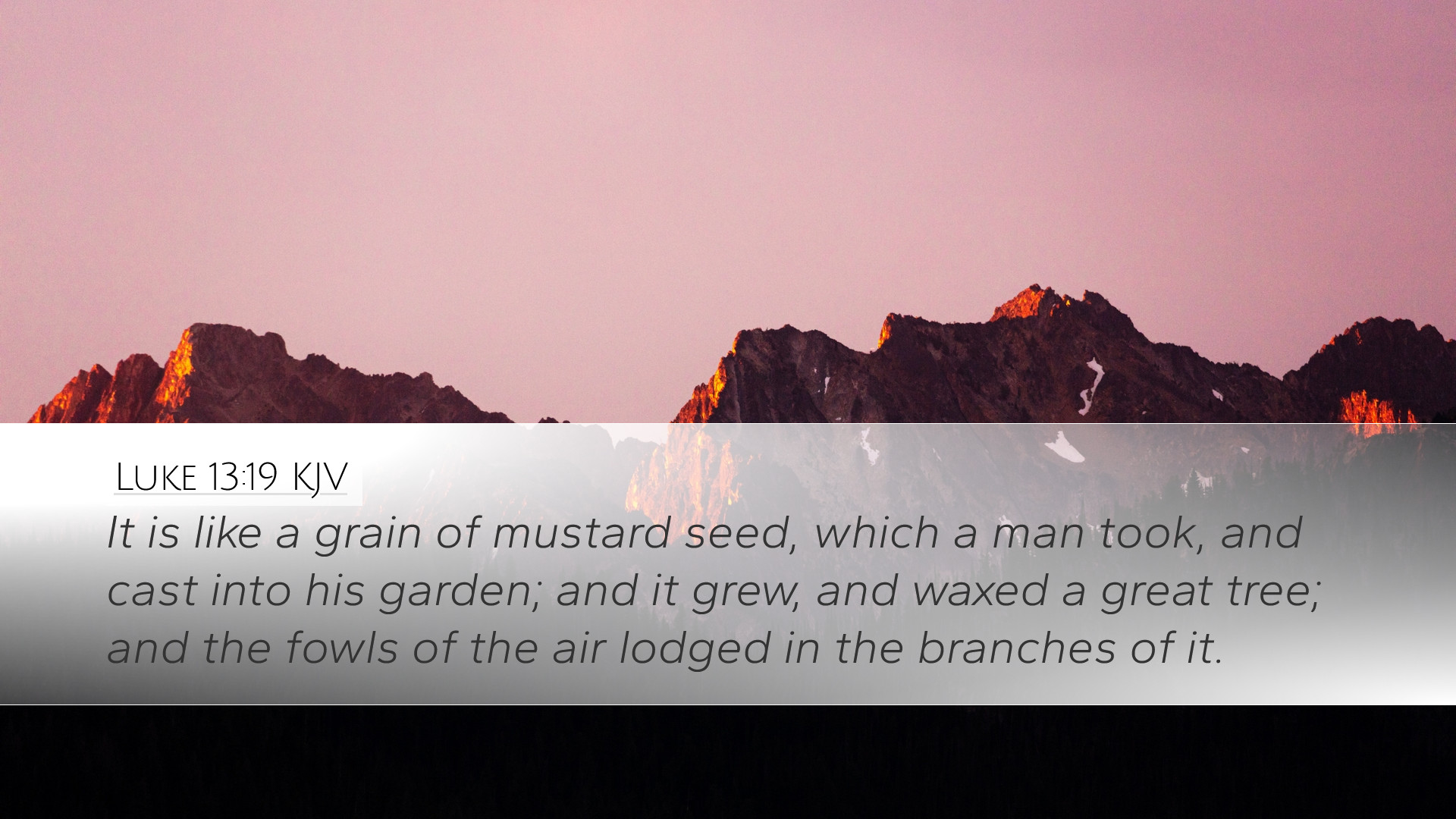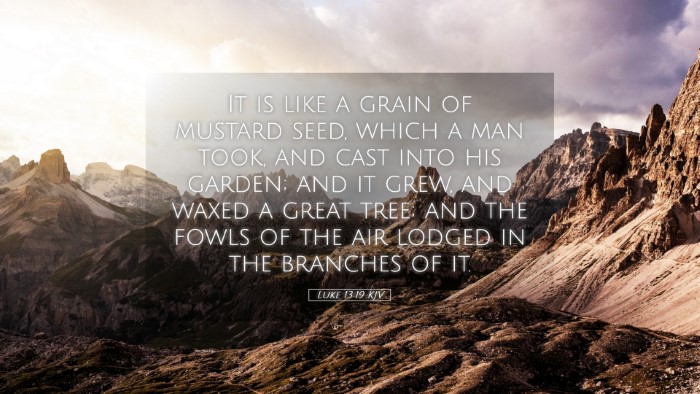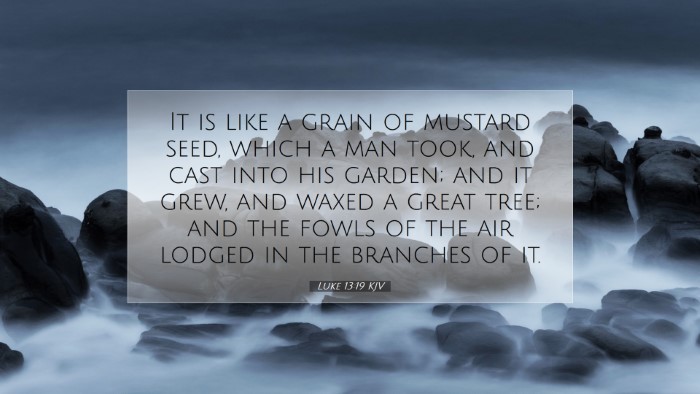Commentary on Luke 13:19
Verse: “It is like a grain of mustard seed, which a man took and cast into his garden; and it grew, and waxed a great tree; and the fowls of the air lodged in the branches of it.” (Luke 13:19, KJV)
This verse is part of a larger discourse where Jesus uses parables to illustrate the nature of the Kingdom of God. The comparison to a mustard seed is particularly significant, as it denotes both the humble beginnings and the expansive potential of the Kingdom.
Insights from Public Domain Commentaries
Matthew Henry’s Commentary
Matthew Henry notes that the mustard seed is among the smallest of all seeds, which serves to highlight the majestic growth from such a humble origin. This parallels the growth of God’s kingdom, which began with Christ and His disciples in an insignificant manner but has grown worldwide.
- Humble Beginnings: Henry emphasizes that the mustard seed represents the initial stage of the Church, reflecting how it started with few followers and grew to encompass nations.
- Divine Growth: The growth from a seed to a sizable tree illustrates the action of God facilitating this expansion. It signifies how the Kingdom is not merely an enterprise led by human efforts but a divine institution blessed by God.
- Inclusivity: The reference to the fowls of the air lodging in its branches indicates that the Kingdom provides refuge and inclusion, welcoming those who seek shelter, just as believers find rest in Christ.
Albert Barnes’ Notes on the New Testament
Albert Barnes interprets the mustard seed as a symbol of faith and the Kingdom of God. He asserts that the small beginnings of faith can lead to immense spiritual growth.
- Faith’s Potential: Barnes notes that just as a small mustard seed grows into a large tree, so too can a small amount of faith grow within a believer, leading to profound spiritual authority and influence.
- Universal Reach: The emphasis on birds nesting in the branches is interpreted as the universality of the Christian faith. All believers find a place and a purpose in the expansive reach of the Kingdom.
- Encouragement for Believers: This metaphor serves as encouragement for believers to recognize the power of their faith, no matter how small it may seem at first.
Adam Clarke’s Commentary
Adam Clarke provides a more detailed botanical insight into the mustard plant, noting that while it is small, it can grow to significant heights. This reflects the very attributes of the Kingdom of God.
- Natural Growth: Clarke highlights the natural tendency of the mustard seed to grow, emphasizing that similarly, the Kingdom of God has an innate tendency to prosper and grow when properly nurtured.
- Significance of the Tree: The size of the tree, as described, symbolizes strength and stability, when often one would not expect such from a small seed. This mirrors the stability found in God’s Kingdom, despite external challenges.
- Spiritual Refuge: The tree’s branches providing refuge for birds illustrates the safety found in the Church and the Kingdom—a place for the weary and lost to find solace.
Theological Implications
This verse, encapsulating the essence of the Kingdom of God, raises significant theological themes that resonate with various aspects of Christian faith.
- Grace and Growth: The metaphor emphasizes God’s grace in facilitating growth—spiritual, communal, and global.
- Hope in Small Beginnings: It assures believers that no matter the size of their initial faith or significance, great things can come from them through God’s power.
- Community and Welcome: The illustration of the mustard tree being a habitat for birds beckons the Church to embrace and nurture a welcoming community, one that provides shelter to the lost and broken.
Application for Pastors and Church Leaders
For pastors and church leaders, Luke 13:19 serves as a profound lesson in leadership and kingdom-building.
- Embrace Small Beginnings: Leaders are encouraged to value small groups and the initial stages of ministry as they can lead to significant impacts when faithfully nurtured.
- Invest in Growth: The importance of investing in the spiritual growth of congregants mirrors the nurturing of a seed to ensure it flourishes.
- Foster Inclusivity: Churches should aim to be inclusive, ensuring that people from all backgrounds find refuge within their community, emulating the Kingdom's welcoming nature.
Conclusion
Luke 13:19 serves as a delicate reminder of the power of God to transform the seemingly insignificant into something magnificent. The parable of the mustard seed not only speaks to the growth of God's Kingdom but also encourages personal faith growth and a commitment to community. It challenges believers to recognize the inherent potential within their faith and the broader Church, while also advocating for a ministry characterized by inclusivity, hope, and divine investment in humanity’s salvation.


